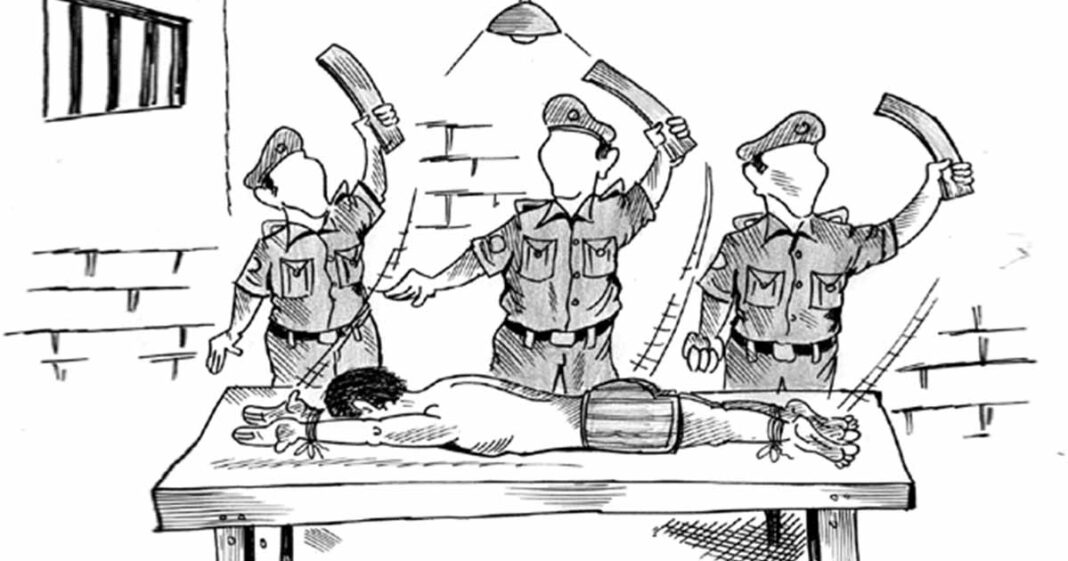Dhanushka Silva.
In the judgment delivered on 18th June 2025, the Supreme Court of Sri Lanka reaffirmed the sanctity of fundamental rights by holding two police officers personally accountable for the brutal torture and unlawful detention of a young sales representative, Mr. P.A.C. Madushan. The decision is not only a victory for the victim but also a sobering reminder to the entire law enforcement system that abuse of power will not be tolerated.
The Incident
The case revolved around events that began in June 2019. Mr. Madushan, employed as a grocery sales representative, was falsely accused of stealing jewellery from a store owned by a complainant in Bentota. On 23rd June 2019, he voluntarily reported to the Uragasmanhandiya Police Station after being informed of a complaint. He arrived with legal counsel, who was assured that Madushan would be released after a routine statement. According to the court findings, once the lawyer left, Mr. Madushan was subjected to severe torture by police officers. He was handcuffed, hung from a beam by his wrists, punched in his abdomen, and assaulted in other degrading ways. Officers even threatened to charge him with possession of a hand grenade unless he confessed.
The torture continued over two days. Witnesses, including Madushan’s mother and his sales manager, later attested to his condition, describing his arms hanging lifelessly and his body showing signs of physical abuse. He was eventually released on bail on 25th June 2019—after a cash settlement of Rs. 300,000 was allegedly demanded.
Medical Evidence
The injuries Mr. Madushan sustained were not just visible—they were medically documented. He was admitted to Nagoda General Hospital and later transferred to the National Hospital in Colombo. The Judicial Medical Officer (JMO) confirmed that his injuries were consistent with hanging by the wrists and inflicted non-accidental trauma. Notably, he lost all movement in his upper limbs—a severe and lasting injury. The court observed that neither of the accused officers could offer any plausible explanation for these injuries. Their defense—marked by contradictions and procedural loopholes—failed to convince the bench.
The Supreme Court’s Ruling
The three-judge bench unanimously ruled in favor of the petitioner, holding that his fundamental rights under Articles 11 (freedom from torture), 12(1) (equality before the law), 13(1) and 13(2) (safeguards against arbitrary arrest and detention) had been clearly violated.
Justice A.L. Shiran Gooneratne, delivering the main judgment, stated:
“The acts attributed to the 1st and 2nd Respondents…surpass the threshold contemplated under Article 11 of the Constitution.”
The court also drew from both Sri Lankan and international law—including the United Nations Convention Against Torture (CAT)—to demonstrate that what Mr. Madushan endured was not merely misconduct, but torture in the legal and moral sense. In a meaningful move, the Court ordered the two police officers involved to pay Rs. 1 million each in personal compensation to Mr. Madushan. The judgment also directed the Registrar to send a certified copy to the National Police Commission for disciplinary action.
Why This Matters?
This ruling comes at a time when public trust in Sri Lanka’s law enforcement is under strain. Allegations of torture, abuse, and arbitrary detention are not uncommon, yet rarely do cases end in such clear judicial condemnation. The Court emphasized that constitutional protections must be upheld, regardless of who the victim is. As noted in the judgment:
“Every person in this country, be he a criminal or not, is entitled to this right to the fullest content of its guarantee.”
The judgment is a milestone in reinforcing that police powers are not absolute. They are granted by the public, to serve the public—and must be exercised within the bounds of the law.
A Systemic Message
By holding individual officers personally liable, the Court sent a strong message that misconduct will carry consequences. It also set a precedent that courts can and will rely on medical evidence, consistency of narrative, and corroborating witness accounts to weigh the truth. Crucially, the judgment sheds light on procedural failures. The police failed to produce Mr. Madushan before a Magistrate within the required 24-hour period. There were discrepancies in arrest records, questionable affidavits, and unsupported denials—all of which the Court rejected.
As the judgment warns:
“Once torture has become acclimatized in a legal system it spreads like an infectious disease. It saves the labour of investigation. It hardens and brutalizes those who have become accustomed to use it.”
The Supreme Court’s decision should trigger institutional reform—not just individual accountability. Law enforcement officers must be trained and constantly reminded that their authority ends where abuse begins. Independent oversight mechanisms like the Human Rights Commission and the National Police Commission must be empowered and responsive.
This case is not just about justice for one man. It’s a reminder that a society cannot claim to uphold the rule of law if it tolerates the very agents of law breaking it with impunity. The Supreme Court’s landmark judgment in SC FR 378/2019 has reaffirmed the enduring principle that no one is above the Constitution—not even those tasked with enforcing it. Justice for P.A.C. Madushan is justice for every citizen who believes in dignity, fairness, and the promise of equal protection under the law.
